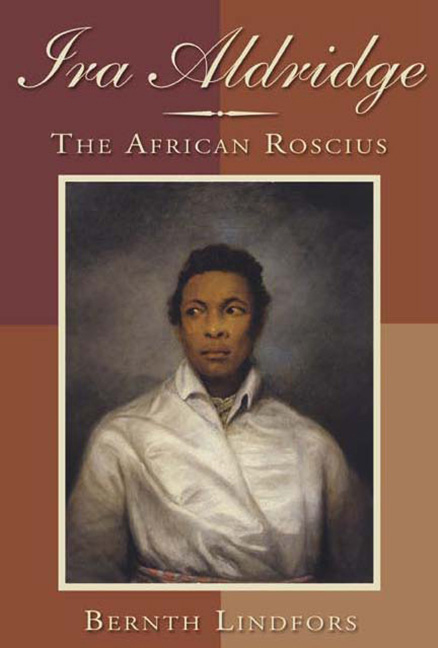Book contents
- Frontmatter
- Miscellaneous Frontmatter
- Contents
- List of Illustrations
- Acknowledgments
- Introduction
- Part One: The Life
- Part Two: The Career
- 8 Ira Aldridge's Fight for Equality
- 9 Ira Aldridge in Manchester
- 10 Acting Black: Othello, Othello Burlesques, and the Performance of Blackness
- 11 Ira Aldridge: Shakespeare and Minstrelsy
- 12 “Mislike me not for my complexion … “: Ira Aldridge in Whiteface
- 13 Ira Aldridge as Macbeth and King Lear
- 14 Creating the Black Hero: Ira Aldridge's The Black Doctor
- 15 The First American on the Zagreb Stage
- 16 A Heartwarming, Radiant Othello in the Netherlands, 1855
- 17 Ira Aldridge's Performances in Meiningen
- 18 “Othello's Occupation's Gone!” The African Roscius in Poland, 1853–67
- Notes on Contributors
- Index
- Miscellaneous Endmatter
9 - Ira Aldridge in Manchester
from Part Two: The Career
Published online by Cambridge University Press: 26 October 2017
- Frontmatter
- Miscellaneous Frontmatter
- Contents
- List of Illustrations
- Acknowledgments
- Introduction
- Part One: The Life
- Part Two: The Career
- 8 Ira Aldridge's Fight for Equality
- 9 Ira Aldridge in Manchester
- 10 Acting Black: Othello, Othello Burlesques, and the Performance of Blackness
- 11 Ira Aldridge: Shakespeare and Minstrelsy
- 12 “Mislike me not for my complexion … “: Ira Aldridge in Whiteface
- 13 Ira Aldridge as Macbeth and King Lear
- 14 Creating the Black Hero: Ira Aldridge's The Black Doctor
- 15 The First American on the Zagreb Stage
- 16 A Heartwarming, Radiant Othello in the Netherlands, 1855
- 17 Ira Aldridge's Performances in Meiningen
- 18 “Othello's Occupation's Gone!” The African Roscius in Poland, 1853–67
- Notes on Contributors
- Index
- Miscellaneous Endmatter
Summary
On Saturday, February 10, 1827, the Manchester Guardian announced the coming appearance of “the African Roscius” at the Theatre Royal, Manchester. After referring to his “success in New York, and in all the principal theatres of the United States” and to his performances “in the Theatres Royal, Bath, Bristol, Brighton, Plymouth, Exeter, and upwards of Fifty nights at the Royal Coburg Theatre, London, with universal approbation,” the notice stated that he would spend one night in Manchester on his way to Edinburgh and Glasgow. A note in the Manchester Courier the following week (February 17, 1827) emphasized the adventurous nature of the theatrical event, telling the public that “the spirited manager of this establishment seems determined to spare no pains to render the amusements at the theatre as attractive as circumstances will permit.” The attitude behind this retains a protective ambiguity toward the experiment of introducing a black actor.
The “African Roscius” was the way in which Ira Aldridge, who began to act in Britain in 1825, was usually billed. He also appeared under the name of “Mr. Keene,” thus borrowing some of the prestige of Edmund Kean, then the foremost tragedian of the English stage: at that time this was considered an acceptable method of publicity. The Manchester playbill advertising his second appearance on February 17, 1827, calls attention to “the singular novelty of An Actor of Colour, personating the routine of Moorish and African characters,” and encourages the public with assurances of the crowded audiences that have appreciated his talents. On that same day the Manchester Guardian published an appreciation of Aldridge's performance as Gambia in The Slave, saying it was done “without having the slightest occasion for having the cosmetic assistance of burnt cork.” The theater critic asserts his intention of “forming a more correct judgement of the powers of this new aspirant to dramatic fame, this evening; when he will appear in the character of Othello”—the one-night stand announced previously being a very usual publicity gimmick. Unfortunately, the paper had no space for the critic's comments on this performance, or perhaps the critic never wrote his piece. For whatever reason, this important occasion, Aldridge's first appearance as Othello in Manchester, goes without comment. The Manchester Courier does praise the African Roscius's appearance as Gambia “in a style so truly natural, that one might have taken him for the character he represented.”
- Type
- Chapter
- Information
- Ira AldridgeThe African Roscius, pp. 126 - 134Publisher: Boydell & BrewerPrint publication year: 2007

